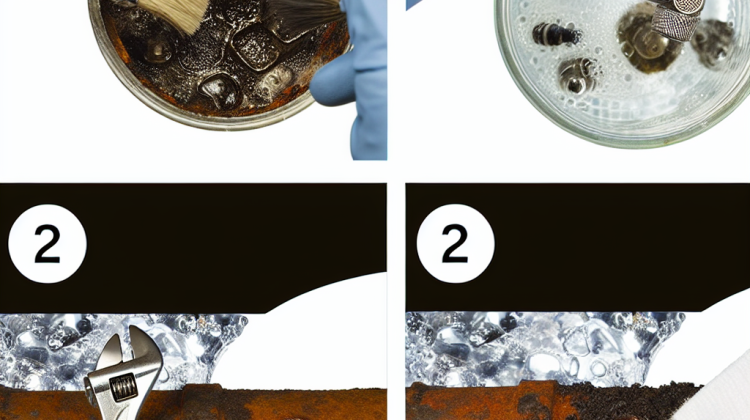
Did you know that rust and corrosion can turn those shiny plumbing parts into a stubborn mess? Yup, it’s true! Over time, pipes and fittings can corrode, making it super hard to unscrew or loosen them. This is a common problem, especially in older homes where the plumbing was installed ages ago. Just think about it—lifetime connections can sometimes mean a lifetime of struggle when it comes time to fix or replace them.
A long time ago, people didn’t think much about plumbing. Pipes were just pipes, right? However, as time marched on, folks started using metal pipes that could get rusty and corroded. Now, with the modern world relying heavily on plumbing, knowing how to deal with corroded connections is pretty crucial. Imagine trying to fix a leaky faucet but ending up with a wrench that won’t budge! It’s enough to make anyone pull their hair out.
When dealing with these tricky connections, one handy trick involves grabbing some of that trusty penetrating oil. This magical potion seeps into the rust and helps loosen things up. You just spray it on the rusty part and wait a little while. Who knew a little spray could work wonders? After it soaks in, you might find that pesky connection loosening like a child’s grip on a balloon!
Another nifty method includes using heat. Now, don’t go playing with fire, but a heat gun or even a hairdryer can help! Applying gentle heat makes the metal expand, and believe it or not, that can help break the rust’s grip. Just don’t overdo it—nobody wants to melt pipes or catch something on fire. It’s all about being careful while getting that connection nice and warmed up.
And here’s a fun little fact: using the right tools makes a world of difference. A pipe wrench is usually a must-have for these types of jobs. But if you’ve got a pair of pliers, they’ll do the trick too! Just remember to always turn to the left to loosen, ‘cause turning to the right will only tighten it further. It’s like a little dance with your plumbing!
Lastly, there are times when it might be best to call in a pro. If it’s being super stubborn or seems way too corroded, don’t hesitate to reach out to a plumber. They’re like superheroes of the plumbing world, ready to save the day when things go haywire. Plus, you can kick back, relax, and leave the tough stuff to someone who knows their way around a wrench!
How to Loosen Corroded Plumbing Connections
When tackling corroded plumbing connections, it can feel like you’re wrestling an octopus. But with a bit of patience, the right tools, and some tricks up your sleeve, you can get those stubborn pipes to budge. Let’s dive right into the steps you can take!
Gather Your Tools
Before you get started, make sure you’ve got everything you need. You don’t want to be halfway through a job and realize you’re missing something important. Here’s a quick list:
- Wrench or adjustable pliers
- Pipe wrench
- PBlaster or penetrating oil
- Wire brush
- Bucket (to catch any water)
- Gloves and safety goggles
Turn Off the Water
First things first, you’ve gotta turn off the water supply. Nothing’s worse than a surprise shower when you’re working on a pipe! Find the shut-off valve and give it a twist. If you’re not sure where it is, just follow the pipe back to where it enters your house.
Clean the Connections
Now, grab your wire brush. You’ll want to scrub away any rust or debris that’s hanging on. It’s like cleaning the gunk off a dirty plate—you want a nice, smooth surface.
Apply Penetrating Oil
Next up, grab that penetrating oil. Spray a generous amount onto the corroded connections. Just let it sit for about 15 to 20 minutes. This stuff does wonders and works to ease those tough spots. You can almost hear it saying, “Let me help you out!”
Use the Right Tools
Now it’s time to put those tools to good use! If the connection’s really stubborn, get your pipe wrench. It’s got a strong grip—just make sure you’re turning it the right way! A handy tip: always remember “righty-tighty, lefty-loosey.” But if it’s still not budging, try using a little heat.
Apply Heat
If things are still tight, sometimes heat can help. Carefully use a heat gun or even a blowtorch if you’re feeling brave! Just be super careful to avoid damaging the pipes. It’s best to warm the metal gradually, having a bucket nearby just in case.
Try a Hammer (With Care)
If it’s still on the stubborn side, a little tap-tap-tap with a hammer might do the trick. Just be gentle! You don’t want to smash anything beyond repair.
Know When to Seek Help
Sometimes, it’s best to know your limits. If you’re worried or if things are too tight, calling a plumber isn’t a bad idea. They’ve got the experience and tools to do the job safely.
Remember, though, that around 70% of plumbing problems can be tackled with the right approach. So don’t lose hope if it seems tough—you’ve got this!
“`html
How to Loosen Corroded Plumbing Connections FAQ
What tools do I need to loosen corroded plumbing connections?
You’ll need a few simple tools: a wrench, some penetrating oil, time, and a bit of patience. Sometimes a gentle hammer tap can help, too!
What is penetrating oil?
Pene-trating oil is a special spray that helps loosen rusted or stuck metal parts. It’s like magic juice for stubborn screws and bolts!
How do I apply penetrating oil?
Just spray a little bit on the corroded connection and let it sit for about 10 to 15 minutes. This gives it time to work its magic!
Can I use heat to loosen plumbing connections?
Yes, you can! But be super careful! You can use a heat gun or a hairdryer to warm up the connection. Warm metal can sometimes be easier to unscrew.
What if the connection still won’t budge?
If it’s still stuck, give it some more time! Reapply the oil, and try again later. Sometimes, letting it sit overnight works wonders!
Is it dangerous to work on plumbing?
It can be a little tricky, but if you’re cautious, you’ll be fine! Always turn off the water supply before you start working!
Can I do this myself or should I call a plumber?
If you feel comfortable and have basic tools, you can try it yourself. But if it’s really stuck or too complicated, it’s okay to call a pro!
What if it breaks while trying to loosen it?
Don’t panic! Sometimes things break, but if you’re careful, you can usually fix it. Just make sure to have extra parts handy or call a plumber for help.
How do I know if a connection is corroded?
Look for rust, flaky build-up, or signs of leaking. If the metal looks rough instead of shiny, it might be corroded!
Can I prevent plumbing connections from corroding?
Yes, you can! Keep everything clean and fix leaks right away. A little TLC goes a long way in keeping your plumbing happy!
“`
Conclusion
To loosen corroded plumbing connections, start by giving them a good soak with penetrating oil. This magic potion breaks down rust and makes those stubborn joints much easier to turn. Remember to let it sit for about 15-30 minutes to really do its work. Once that’s set, grab your trusty wrench and try to turn the connection gently. If it still feels stuck, don’t force it! Instead, hit it with some heat from a hairdryer or heat gun. Just make sure the heat doesn’t get too close to plastic parts—they don’t like heat much!
If things still aren’t budging, a little tap with a hammer on the wrench can loosen things up. But be gentle, you don’t want to break anything! For really tough spots, consider using a pipe wrench for extra grip. And always be ready to clean up any mess, ’cause you might get some drips when you finally get it loose. Just follow these steps, and those corroded connections will be as good as new in no time. Happy fixing!
